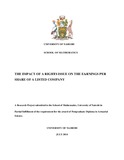| dc.description.abstract | A rights issue is a way by which a listed company can raise additional capital. However, instead of going to the public, the company gives its existing shareholders the right to subscribe to newly issued shares in proportion to their existing and market capitalization. In case of a rights issue, since additional equity is raised, the issuing company's equity base rises to the extent of the is-sue. In theory, every new issue has some kind of diluting effect and hence as a result of a fall in the market price in proportion to an increase in the number of shares, the market capitalization remains unaffected.
In this paper, KQ rights issue in 2012 is considered. Consistent with empirical results for
Seasoned equity offerings in developed financial markets, there is a statistically significant de-cline in the earnings per share (EPS) by 23% and the market share price (MPS) after the rights equity issue. In the KQ case, this decline in performance is made more severe by economic and geopolitical environment after the issue and the aggressive expansion plan that national carrier embarked on.
Further, various proxies measuring market valuation also declined during the post-issue period after a run up in the pre-issue period. The results of the study suggest that over-investment hy-pothesis and agency models can better explain the decline in performance as measured by the EPS compared to asymmetric information hypothesis. The results also indicate that rights equity issues are not simple de-leveraging decisions.
These findings have implications for several groups of capital market participants as follows:
The investing public and analyst who are too optimistic about the issuers should consider deteriorating performance while arriving at the valuations.
Investors should be vigilant about the ‘empire building’ implications of increased in-vestments through rights issue.
Optimistic managers should reassess the investment opportunities and have conservative plans before approaching the market.
The policy makers and regulators should come out with better regulatory framework to control the use of funds acquired from the rights issue | en_US |

